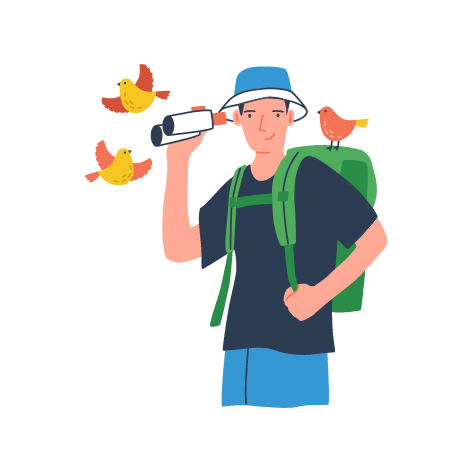
Most children are very interested in birds. And with good reason, because many of the parrot species share their intelligence level with young children!
Your child may ask for a bird for her birthday, or for Christmas or Hannukah.
He might decide to save up his allowance to buy a bird himself.
Lots of parents often wonder about the best way to help their child learn about exotic birds.
Consider your child’s age.
Children under the age of 7 or 8 should not be allowed to accept full responsibility for a bird.
It might be nice to have a “family bird”, but young children just won’t be able to care for a bird without some help.
Does your child have breathing problems?
Kids with environmental allergies such as asthma may suffer problems with birds.
Many birds, such as Cockatiels and African Greys, are especially dusty.
Have them visit a pet store with birds first to see if the dust bothers them.
Does your child know how to behave around birds?
Children should be taught to approach their birds calmly and with low energy.
Birds can become stressed and anxious around loud and rambunctious children.
Older children can care better
It is often seen that older kids are apt for smaller birds, such as Budgies, Cockatiels, and Lovebirds on their own provided a parent keeps an eye on things.
Larger birds can be dangerous to children. The bird should not be kept in the child’s room, since that will only make the bird very lonely.
Birds should always be housed in a busy part of the house, such as a living room, family room, or den.
Does your child want a cuddly bird?
If your child is looking for a “hands-on” bird he can cuddle, try to find a well-socialized Cockatiel.
Budgies (Parakeets) will not be cuddly. Cockatiels are generally pretty friendly, and many enjoy hanging out with people and will ask for head scratches.
Adopt a bird with your child.
I always encourage the adoption of needy birds over purchasing a bird from a pet store.
Explore different places you can adopt a bird before making your decision.
Don’t give birds as gifts allow your child to be present when choosing the bird.
Some birds just won’t like children, and you’ll want to choose one that seems to enjoy the company.
Can your child handle responsibility?
Your child should be prepared to clean the birdcage every day, as well as change the food and water every day.
The bird should be allowed to come out of the cage for at least a few hours each day, in a safe room without other pets or dangers like doors to the outside.
You will need to supervise to ensure the bird is being fed and cleaned up properly.
Be prepared for veterinary bills.
You should be prepared to take the bird to the vet with your child yearly for regular check-ups, and any time the bird seems ill.
You need to be prepared to pay for all vet visits unless your child is older and has a job.
Even then, veterinary care can be very expensive, and you should be prepared to help your child pay for vet care.
Let your child volunteer with birds.
If you decide that a bird is not a good fit for your family and your child is still interested in them,
I would encourage you to take your child to volunteer at an avian rescue or sanctuary facility.
This will be a great way for your child to learn about birds first-hand, and one day when he is old enough, he can adopt one on his own

Hi, There and Welcome to BirdsNews.com, is here to help you learn and care about pet birds. and this blog is a journal of everything I’ve learned.
